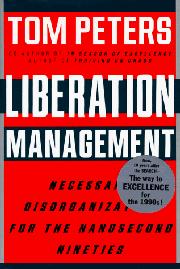

LIBERATION MANAGEMENT
Necessary Disorganization for the Nanosecond Nineties
by Tom Peters
Apparently bent on doing for management science what Timothy Leary did for psychology, Peters here extends the cheerfully anarchic precepts advanced in Thriving on Chaos (1987)—which in turn represented a sharp departure from the more conventional wisdom of the two coauthored works (In Search of Excellence and A Passion for Excellence) that helped make him an archguru in the first place. In the brave new on-line real-time world of the near future, Peters asserts, traditional (i.e., hierarchical and bureaucratic) corporations will have ceased to exist, victims of the ongoing fragmentation in global markets. By his account, the commercial dinosaurs will be replaced by pro-tem networks of project-oriented teams able to take immediate advantage of fleeting opportunities for dernier-cri goods and services. In this demanding if Delphian context, Peters offers a lengthy name-dropping manual chock full of anecdotal advisories on how latter-day executives might adapt themselves and their enterprises, entrepreneurial or otherwise, to tomorrow's unruly economy. Evidently formatted to facilitate browsing, the six-section guide has nearly 50 chapters, more than a few of which boast cheeky titles—e.g., ``Glow! Tingle! Wow! (Yuck!).'' While Peters focuses on (among other major concerns) what he characterizes as necessary disorganization, hustle, information technology, innovation through deconstruction, and fashion, those who read straight through the text will be struck by his reliance on shock value—at one point, he does a riff on quantum mechanics to stress the absurdist aspects of what's in store for business. When (by his own admission) words fail him, Peters goes with coinages—e.g., ``customerization''; ``faith in the unexpected''; ``marketizing,'' etc. Nor does he shrink from ambiguity and paradox. As in his previous outings, here again, in the final analysis, Peters broaches a wealth of ideas without ever managing to be genuinely thoughtful—though you wouldn't know it from the 250,000- copy first printing. (Book-of-the-Month Dual Selection for January)